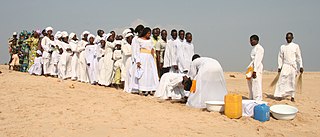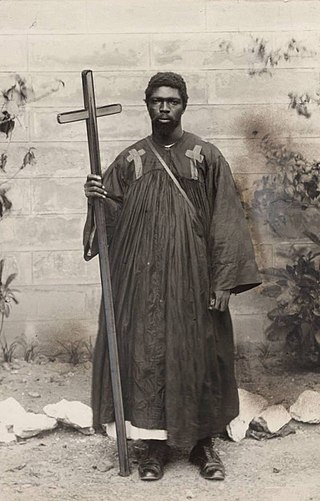Related Research Articles
Pentecostalism or classical Pentecostalism is a Protestant Charismatic Christian movement that emphasizes direct personal experience of God through baptism with the Holy Spirit. The term Pentecostal is derived from Pentecost, an event that commemorates the descent of the Holy Spirit upon the Apostles and other followers of Jesus Christ while they were in Jerusalem celebrating the Feast of Weeks, as described in the Acts of the Apostles.

The International Pentecostal Holiness Church (IPHC) or simply Pentecostal Holiness Church (PHC) is an international Holiness-Pentecostal Christian denomination founded in 1911 with the merger of two older denominations. Historically centered in the Southeastern United States, particularly the Carolinas and Georgia, the Pentecostal Holiness Church now has an international presence. In 2000, the church reported a worldwide membership of over one million—over three million including affiliates.
The Latter Rain, also known as the New Order or the New Order of the Latter Rain, was a post–World War II movement within Pentecostal Christianity which remains controversial. The movement saw itself as a continuation of the restorationism of early pentecostalism. The movement began with major revivals between 1948 and 1952 and became established as a large semi-organized movement by 1952. It continued into the 1960s. The movement had a profound impact on subsequent movements as its participants dispersed throughout the broader charismatic and pentecostal movements beginning in the 1960s.

William Marrion Branham was an American Christian minister and faith healer who initiated the post-World War II healing revival, and claimed to be a prophet with the anointing of Elijah, who had come to prelude Christ's second coming; some of his followers have been labeled a "doomsday cult". He is credited as "a principal architect of restorationist thought" for charismatics by some Christian historians, and has been called the "leading individual in the Second Wave of Pentecostalism." He made a lasting influence on televangelism and the modern charismatic movement, and his "stage presence remains a legend unparalleled in the history of the Charismatic movement". At the time they were held, his inter-denominational meetings were the largest religious meetings ever held in some American cities. Branham was the first American deliverance minister to successfully campaign in Europe; his ministry reached global audiences with major campaigns held in North America, Europe, Africa, and India.

Charles F. Parham was an American preacher and evangelist. Together with William J. Seymour, Parham was one of the two central figures in the development and early spread of American Pentecostalism. It was Parham who associated glossolalia with the baptism in the Holy Spirit, a theological connection crucial to the emergence of Pentecostalism as a distinct movement. Parham was the first preacher to articulate Pentecostalism's distinctive doctrine of evidential tongues, and to expand the movement.
Christ Community Church in Zion, Illinois, formerly the Christian Catholic Church or Christian Catholic Apostolic Church, is an evangelical non-denominational church founded in 1896 by John Alexander Dowie. The city of Zion was founded by Dowie as a religious community to establish a society on the principles of the Kingdom of God. Members are sometimes called Zionites.

An African-initiated church (AIC) is a Christian church independently started in Africa by Africans rather than chiefly by missionaries from another continent.
The term "Aladura" means "praying person" in Yoruba. Aladura is a classification of indigenous churches that started in Yoruba land in the early 20th century. These churches believe in the efficacy of prayers and practical guidance by the Living God through his Holy Spirit in all its programs.

The Apostolic Faith Mission of South Africa (AFM) is a classical Pentecostal Christian denomination in South Africa. With 1.2 million adherents, it is South Africa's largest Pentecostal church and the fifth largest religious grouping in South Africa representing 7.6 percent of the population. Dr. Isak Burger has led the AFM as president since 1996 when the white and black branches of the church were united. It is a member of the Apostolic Faith Mission International, a fellowship of 23 AFM national churches. It is also a member of the South African Council of Churches.
Joseph Ayo Babalola was a Nigerian Christian minister and the leader of the Christ Apostolic Church, popularly called CAC in Nigeria. He was a healing evangelist.

Christ Apostolic Church (CAC) is the first Aladura Pentecostal church present in Nigeria. It arose in the first half of the 20th century, in the then-British empire. It was formally established in 1941 after a split from the Apostolic Church which the original Aladura organization had invited to Nigeria. Its growth was led by Joseph Ayo Babalola, a road construction driver who became its first General Evangelist. The revival led by Apostle Joseph Ayo Babalola resulted in thousands burning their traditional fetishes and giving their lives to Christ. This disturbed the colonial authorities, and allegations included witch-hunting and opposition to hospitals and medicine. Babalola was arrested and jailed.

Christianity is the religion with the largest following in Ghana. Christian denominations include Catholics, Methodists, Anglicans, Presbyterians, Lutherans, Seventh-Day Adventists, Pentecostals, Baptists, Evangelical Charismatics, Latter-day Saints, etc.
Reverend James McKeown was an Irish missionary who spent considerable time in the Gold Coast, now Ghana. He was the first Pentecostal missionary to come to Ghana from the United Kingdom and was instrumental in the establishment of The Apostolic Church - Ghana. In the 1950s he founded the Church of Pentecost, the church with the biggest denomination in Ghana and which has branches all over the world. He is considered a "pioneer of Ghanaian Pentecostalism".
The doctrines and practices of modern Pentecostalism placed a high priority on international evangelization. The movement spread to Africa soon after the 1906 Azusa Street Revival in Los Angeles.
The Apostolic Church - Ghana is a denomination emanating from the Pentecostal movement which started from the 1904–1905 Welsh revival. It practices self-governing and claims to own local churches in every district in Ghana and foreign mission fields with its headquarters in Accra, Ghana. The church is firmly identified as a Pentecostal, Trinitarian, Evangelical and Bible-believing church.
Apostle Peter Kwaku Mensah Newman Anim was born on February 4, 1890 to Simon Appiagyei and Hannah Lartebea of Boso in the Volta Region of Ghana. He is credited as the originator of Classical Pentecostalism in Ghana. His intense interest in a magazine called The Sword of the Spirit, published through correspondence, with its editor, Pastor A. Clark, founder of the Faith Tabernacle Church, Philadelphia led him into receiving healing from a chronic stomach disorder and guinea worm infestation miraculously through prayer, a new experience from his Presbyterian upbringing. He therefore embraced the teachings of divine healing, having tested their efficacy by obtaining healing himself, he sought to inculcate this in a prayer group he formed in Asamankese. This group eventually, would become the pioneers of Ghana Classical Pentecostalism.
Joseph Egyir-Paintsil (1928-1981) was a Ghanaian Evangelist, an Apostle and the first General Secretary of The Church of Pentecost (COP). He was the eighth son born of Opanyin Kojo Paintsir and Maame Adjoa Kwansima, a native of Abura-Dunkwa in the Central Region (Ghana). He was called into full-time ministry of COP in 1949, ordained as a Pastor in 1952 and, subsequently, appointed General Secretary the same year.

Samson Kwame Oppong also Sampson Opon or Opong was a controversial Akan Christian preacher-prophet on the Gold Coast in the 1920s. His missionary zeal, unconventional and fiery ministry helped entrench Methodism in the Ashanti and Brong-Ahafo Regions of Ghana, through a large-scale spiritual awakening and revival. Though his knowledge of Christian theology was minimal, he is known to have employed threats and other coercive techniques to proselytise in the Ghanaian towns and villages he worked in.
Margaret Peoples Shirer was an American missionary and one of the first Pentecostal Christian missionaries to West Africa. With little formal education, at the age of twenty-two, she traveled to Burkina Faso in 1919 with the support of the Assemblies of God. In order to spread the vision of Pentecostal Christianity and to convert people to believers, Margaret Peoples became the first known Western person to learn the language of the Mossi people. She translated portions of the Bible into the Mossi language, Mooré, and used Mossi stories in her preaching. After marrying a fellow missionary, W. Lloyd Shirer, the couple became the first to open an Assemblies of God missions office in Ghana. Shirer learned the Dagbani language in Ghana and translated the biblical books of Matthew, Mark, Acts, Ephesians, 1 Peter into the language. Shirer also served as a missionary for the Assemblies of God in Nigeria. After losing the sponsorship of the Assemblies of God, the couple continued to preach the Pentecostal Christian message in other countries, including Congo and Haiti. After Lloyd Shirer's death in 1972, she moved to Springfield, Missouri, where she recruited others for the mission field.
References
- 1 2 Peter, Anim. "Peter Anim". DACB. Dictionary of African Biographies. Archived from the original on 4 December 2016. Retrieved 13 March 2017.
- ↑ The Christ, Apostolic Church. "Overview". caci. Christ Apostolic Church Int. Retrieved 8 December 2018.
- ↑ Anim, Peter. "History". Christ Apostolic Church. Christ Apostolic ChurchUSA. Retrieved 13 March 2017.
- ↑ Mckeown, James. "Biography of James McKeown". The Church of Pentecost. Retrieved 13 March 2017.
- ↑ Apostolic Church, Ghana. "Brief History". The Apostolic church. Retrieved 13 March 2017.